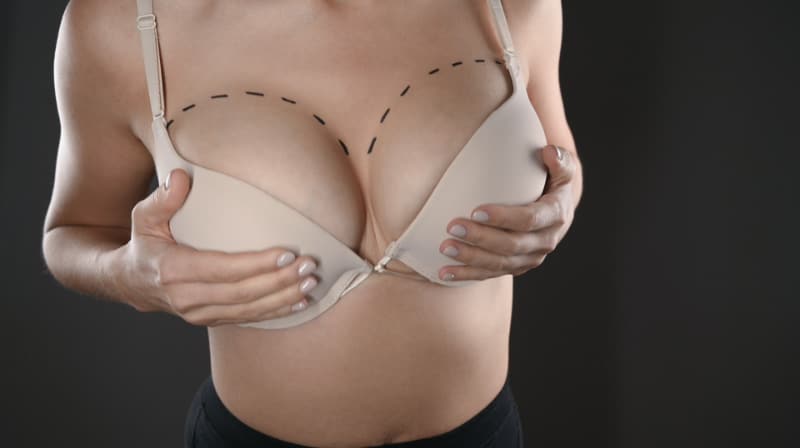
Want to learn about breast reduction weight requirements? If you are persistently bothered by the effects of having large breasts, you may be considering breast reduction surgery.
While this procedure may seem like a drastic option for some women, for those who deal every day with the challenges of macromastia (large breasts), it can be an appealing option. From less back pain and neck pain to fewer unwanted glances to an easier time buying clothes, there are a number of reasons why having smaller breasts could completely change your life.
One thing often holds women back, however, and that’s the uncertainty surrounding breast reduction requirements. That is, women want to know what the minimum breast size for breast reduction is and what overall breast reduction requirements weight are — especially when it being covered by insurance is a factor.
Let’s take a closer look at both of these considerations before outlining some of the other breast reduction requirements you’ll need to know about.
Requirements for Breast Reduction Surgery
If you want your your breast reduction covered by your health insurance , your provider must sign off. In other words, they must accept that your need for breast reduction surgery is medically necessary.
As with any such authorization, you’ll need to meet some requirements. All insurance companies have different requirements, however, so be sure to check with your own provider to see what they need in order to provide coverage.
First, most insurers will want to see that the signs you need breast reduction surgery have been well-documented and ongoing. Likewise, they want to know that there isn’t another solution that could fix the problems you’re having. For example, could your back pain, shoulder pain, or neck pain be related to another physical issue? How long has it been going on?
Once this has been established, some providers will require that you fall into a certain weight category.
Breast Reduction Requirements Weight
When discussing breast reduction weight requirements, doctors and insurance companies will usually base decisions on a patient’s BMI (body mass index). This is a physical measurement that takes into account your height, weight, sex, age, and muscle mass.
Because breast size usually goes down with weight loss, for patients over a certain body mass index BMI (for example, 30 or 35), insurance companies may deny coverage for breast reduction. Instead, they’ll ask you to get your body mass index BMI below 30, 35, or another target number. And, if doing this doesn’t help the symptoms you’re experiencing, then they may provide coverage for breast reduction surgery. Alternatively, they may ask to see documentation that you were unable to lose weight.
Minimum Breast Size for Breast Reduction
Another factor your health insurance coverage provider will consider is how much weight you want to have taken off your breasts. That is, you’ll have to plan for the removal of a certain amount of breast tissue if you want to have the procedure covered by insurance.
Generally speaking, insurance companies will consider this amount in grams. You’ll meet with your plastic surgeon and once you’ve discussed your goals for surgery, you can ask them how many grams of breast tissue they expect to remove.
Again, the minimum amounts will vary from insurer to insurer. Some companies will want to see that at least a flat 450 grams or 550 grams of breast tissue is going to be removed. Others will take into consideration your overall size (height, etc.) and will base the minimum requirements off of that.
Other Breast Reduction Requirements
In addition to meeting the requirements outlined above, patients who want to get breast reduction procedure should:
1. Have consistent struggles with the downsides of having large breasts.
Are you constantly dealing with neck, back, and shoulder pain? Do you struggle with bra strap rashes or have a hard time finding clothing that fits over your chest comfortably? Do unwanted stares or advances make you feel awkward?
These are the types of problems that candidates for breast reduction surgery have a hard time with. Patients also frequently complain about being short of breath (especially when lying down on their backs), tingling and numbness in the arms, and problems performing regular daily activities such as walking and exercising.
Breast reduction surgery can help with all of these issues. In the end, the goal of the procedure is to improve your physical and emotional quality of life.
2. Be in good physical health.
Even if you don’t plan on getting financial help from your insurance company, you should aim to be in good physical health before your procedure. You must be able to safely get through the procedure without serious health risks.
Board Certified Plastic Surgeon Dr. Ashley Steinberg will also want to know that you are not struggling with any serious medical conditions or active infections that may hinder your ability to heal. Be prepared to discuss your medical history at your consultation.
3. Not smoke.
Smoking can inhibit the body’s ability to heal properly, and incisions may take longer to close up for a person who smokes as well.
Smoking also puts patients at higher risk during surgery. It’s a problem for the anesthesia process, and the heart has to work harder during the procedure, which can pose serious health risks, including the possibility of a heart attack or heart failure.
4. Have realistic expectations.
The majority of breast reduction patients say they wish they would have undergone the procedure sooner. In fact, this surgery is one of the most physically and emotionally beneficial procedures available today.
Still, patients must have realistic expectations when it comes to any type of surgery, including breast reduction surgery. It’s important to understand the surgical process itself and what recovery will entail. For example, you’ll need to take time off from school or work and will almost certainly experience some discomfort and pain as you recover. You can find our gallery of breast reduction before and after pictures to see examples of past patients’ surgeries.
You’ll also have some light breast reduction scarring due to the necessary incisions. Fortunately, these scars should heal nicely and be almost invisible by the time you’ve fully recovered.
Questions and Answers
How much do you have to weigh to get a boob reduction?
With a BMI of 35, the preferred practice is a BMI under 30 for surgery. A weight under 190 aligns with this. Eligibility and insurance may vary.
What is the smallest size you can get for a breast reduction?
Your breast’s initial size and your physique influence the decision. Height and weight determine proportion. A cup is the lower limit for reduction, with most patients decreasing one or two cup sizes if they have large breasts.
What happens if I lose 20 pounds after breast reduction?
After breast reduction surgery, if you lose a significant amount of weight, your breasts may slightly decrease in size and firmness. Consult your plastic surgeons about your desired outcomes.
Are you A Candidate for Breast Reduction Surgery?
If you are considering breast reduction and want to learn about weight requirements or the minimum breast size for breast reduction, contact the office of plastic surgeon Dr. Ashley Steinberg today.
References
https://www.cdc.gov/obesity/downloads/bmiforpactitioners.pdf












